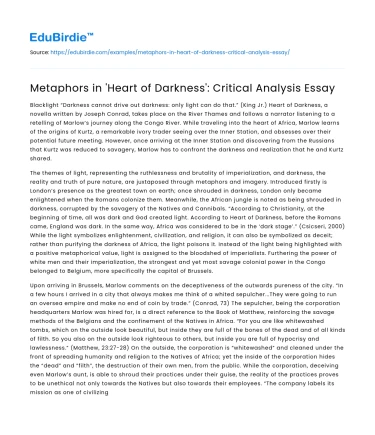Blacklight “Darkness cannot drive out darkness: only light can do that.” (King Jr.) Heart of Darkness, a novella written by Joseph Conrad, takes place on the River Thames and follows a narrator listening to a retelling of Marlow’s journey along the Congo River. While traveling into the heart of Africa, Marlow learns of the origins of Kurtz, a remarkable ivory trader seeing over the Inner Station, and obsesses over their potential future meeting. However, once arriving at the Inner Station and discovering from the Russians that Kurtz was reduced to savagery, Marlow has to confront the darkness and realization that he and Kurtz shared.
The themes of light, representing the ruthlessness and brutality of imperialization, and darkness, the reality and truth of pure nature, are juxtaposed through metaphors and imagery. Introduced firstly is London’s presence as the greatest town on earth; once shrouded in darkness, London only became enlightened when the Romans colonize them. Meanwhile, the African jungle is noted as being shrouded in darkness, corrupted by the savagery of the Natives and Cannibals. “According to Christianity, at the beginning of time, all was dark and God created light. According to Heart of Darkness, before the Romans came, England was dark. In the same way, Africa was considered to be in the ‘dark stage’.” (Csicseri, 2000) While the light symbolizes enlightenment, civilization, and religion, it can also be symbolized as deceit; rather than purifying the darkness of Africa, the light poisons it. Instead of the light being highlighted with a positive metaphorical value, light is assigned to the bloodshed of imperialists. Furthering the power of white men and their imperialization, the strongest and yet most savage colonial power in the Congo belonged to Belgium, more specifically the capital of Brussels.
Save your time!
We can take care of your essay
- Proper editing and formatting
- Free revision, title page, and bibliography
- Flexible prices and money-back guarantee
Upon arriving in Brussels, Marlow comments on the deceptiveness of the outwards pureness of the city. “In a few hours I arrived in a city that always makes me think of a whited sepulcher...They were going to run an oversea empire and make no end of coin by trade.” (Conrad, 73) The sepulcher, being the corporation headquarters Marlow was hired for, is a direct reference to the Book of Matthew, reinforcing the savage methods of the Belgians and the confinement of the Natives in Africa. “For you are like whitewashed tombs, which on the outside look beautiful, but inside they are full of the bones of the dead and of all kinds of filth. So you also on the outside look righteous to others, but inside you are full of hypocrisy and lawlessness.” (Matthew, 23:27-28) On the outside, the corporation is “whitewashed” and cleaned under the front of spreading humanity and religion to the Natives of Africa; yet the inside of the corporation hides the “dead” and “filth”, the destruction of their own men, from the public. While the corporation, deceiving even Marlow’s aunt, is able to shroud their practices under their guise, the reality of the practices proves to be unethical not only towards the Natives but also towards their employees. “The company labels its mission as one of civilizing and enlightening the native peoples, while, in reality, the work along the Congo River is profit-driven... The company’s methods are savage and dehumanizing, resulting in decay and death to both white men and their colonial subjects.” (Qu, 2008) Not only do the corporations imperialize the entirety of Africa by conquering, dividing, and forcing religion onto the Natives, but the pushing of starvation, abuse, and wastefulness towards not only the Natives but also the corporation’s employees fuel their descent into madness.
The real darkness—the darkness of the jungle—is a representation of the truth while the darkness of humanity—the light of the Europeans—is a seed that is planted and rooted in the forest by the corporations. The darkness is the extinction and waste of endangered animals for luxury goods, the dehumanization of colonization that is planted in both Natives and white men, and the greed that germinates inside of men. The symbolization of the darkness reinforces the Europeans’ misjudgment in believing that the jungle represents the savagery of the Natives. However, as Marlow proceeds deeper into the heart of darkness—the jungle—he realizes that savagery is a primitive form of civilization. The darkness of the jungle represents the evil and greed of white, European men, the demise of Kurtz, and the potentiality of Marlow’s tragic downfall. “Never, never before, did this land, this river, this jungle, the very arch of this blazing sky, appear to me so hopeless and so dark, so impenetrable to human thought, so pitiless to human weakness.” (Conrad, 135) Marlow becomes aware that the African jungle is blameless towards the savagery of both Natives and Kurtz. The “hopelessness” and “darkness” that Marlow experiences, the most exposing Subjected to the harshest punishment of the corporation’s corruption is Kurtz, who suffers his imminent demise due to possession of darkness and greed. “All of Europe contributed to the making of Kurtz.” (Conrad, 126) “Gradually, Marlow comes to understand that Kurtz’s madness and brutality is a reflection of the evil that resides in the hearts of all men. The temptation of the grove, the dark side of human nature, has so strong a power over Kurtz that he would rather stay in primitive and savage Africa, free from virtual and legal boundaries of civilization than return to civilization.” (Qu, 2008)






 Stuck on your essay?
Stuck on your essay?

